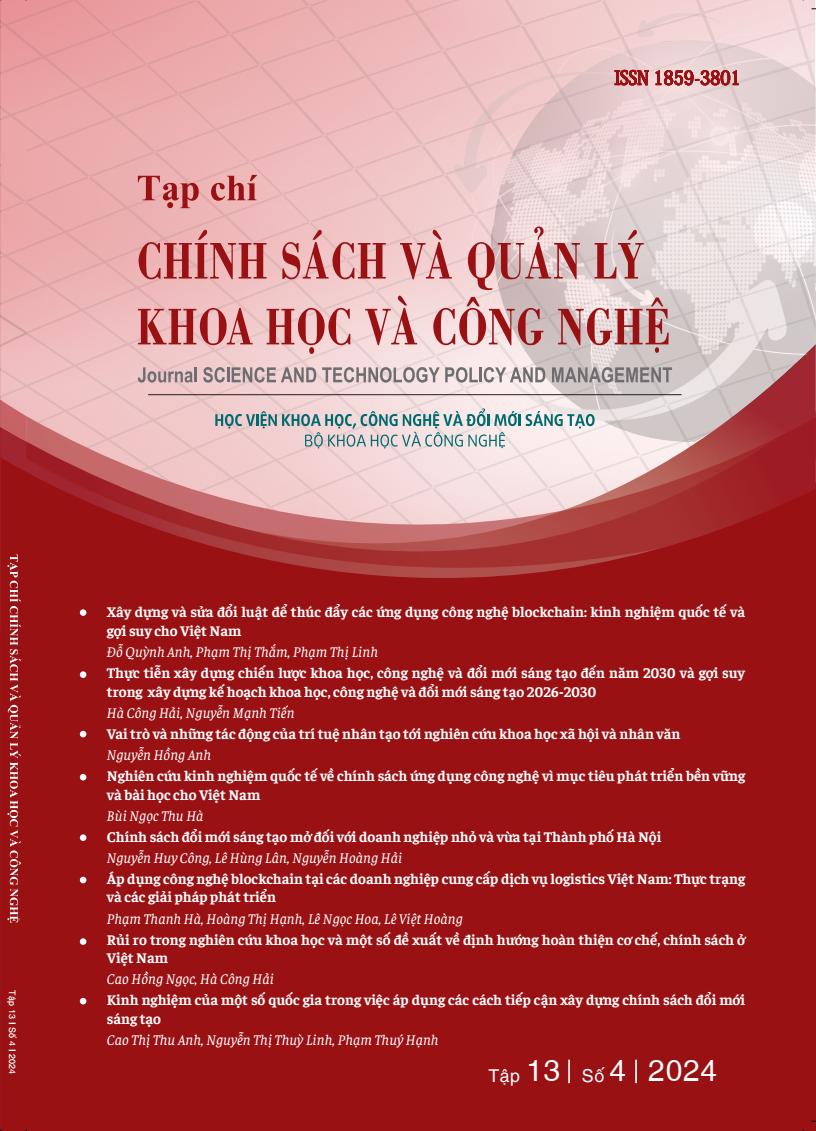Risks in scientific research and some proposals on orientations for improving mechanism and policies in Vietnam
Keywords:
Scientific research, Risk in scientific researchAbstract
Risks are inherent in all spheres of human activity. However, in scientific research, risks are particularly prominent and intrinsic, because research involves exploration, discovery, and innovation, venturing into the unknown where both success and failure are possible. Risks in scientific research can manifest as failure to achieve the stated objectives, unreliable or contradictory results, a lack of practical impact, or ethical and legal violations. Research on risks in scientific research and proposals for improving mechanisms and policies is not a new issue, but it has recently garnered increasing attention from the research community due to the growing importance of the role and mission of science and technology (S&T) in the development and competitiveness of each nation. This article focuses on analysing the nature and causes of risks in scientific research, experience of some countries on mechanisms and policies for dealing with risks in scientific research, with specific reference to the context of Vietnam, and proposes directions for improving mechanisms and policies to manage risks in scientific research in Vietnam in the upcoming period.
Code: 24121001
Downloads
References
Trường Nghiệp vụ quản lý KH&CN (1997). Quản lý Khoa học và Công nghệ. Nxb Khoa học kỹ thuật, Hà Nội.
Viện Ngôn ngữ học (2005). Từ điển tiếng Việt. Nxb Đà Nẵng.
Abraham Aseffa và cộng sự (2020). “External funding to strengthen capacity for research in low-income and middleincome countries: exigence, excellence and equity”. BMJ (British Medical Journal) Global Health, 17 March 2020.
Anderson., (2022). “Risk in Scientific Research: A Comprehensive Framework”. Science Policy and Research Management, 18 (2), 45-61.
Alison Paprica., (2021). “Risks for Academic Research Projects: An Empirical Study of Perceived Negative Risks and Possible Responses”.
Bennett, L., (2022). “Social and Community Risks in Health and Social Science Research: Navigating Public Opposition”. Journal of Community Health Research, 10 (4), 124-137.
Buchwald, Jed Z., & Warwick, Andrew., (2001). Histories of the Electron: The Birth of Microphysics. MIT Press, 2001.
C. Arthur William, Jr. Michael, L. Smith., (1997). Risk Management & Insurance. Publisher: McGraw-Hill/Irwin, 1997
David Apgar., (2006). Risk Intelligence: Learning to Manage What We Don’t Know. Publisher: Harvard Business School Press, 2006.
Franzoni và Stephan,. (2023). “Uncertainty and risk-taking in science: Meaning, measurement and management in peer review of research proposals”. Research Policy, 52 (3).
Goldstein và Kearney., (2020). “Know when to fold ‘em: An empirical description of risk management in public research funding”. Research Policy, 49 (1).
Greenfield, J., Thompson, R., (2023). “Risk Factors in Social Research: Navigating the Ethics of Community-Based Studies”. Journal of Social Research Methods, 29 (2), 67-80.
Harvell, C. D., (2002). “Climate Warming and Disease Risks for Terrestrial and Marine Biota”. Science, 296(5576), 2158-2162.
Japan Society for the Promotion of Science., (2020). “Annual Report on Research Funding in Japan”. JSPS, 2020.
Laster, M., (2017). “The Ethics of Scientific Integrity”. Nature, 545, 289-291.
National Science Foundation., (2020). Annual Report: Investing in Science and Engineering. NSF, 2020.
Rosenzweig, C., (2001). “Climate Change and Extreme Weather Events; Implications for Food Production, Plant Diseases, and Pests”. Global Change & Human Health, 2(2), 90-104.
Sato, Y., (2019). “Government Investment in Technology and Innovation: The Case of Japan”. Japan Review.
Smith, R., (2006). “The Ethical Dilemmas of Research”. Journal of Medical Ethics, 32(1), 12-15.
Sullivan, H., et al. (2023). “Understanding the Nature of Risk in Scientific Research: Frameworks and Implications”. Research Integrity and Peer Review, 11 (1), 1-15.
UK Research and Innovation., (2020). “UKRI Strategy: Driving Research and Innovation”. UKRI, 2020.
Younghwan Kim và cộng sự., (2014). “An international comparative analysis of public acceptance of nuclear energy”. Energy Policy, Volume 66, March 2014, Pages 475-483.
Downloads
Published
How to Cite
Issue
Section
License
Authors who publish with this journal agree to the following terms:
- Authors retain copyright and grant the journal right of first publication with the work simultaneously licensed under a Creative Commons Attribution License that allows others to share the work with an acknowledgement of the work's authorship and initial publication in this journal.
- Authors are able to enter into separate, additional contractual arrangements for the non-exclusive distribution of the journal's published version of the work (e.g., post it to an institutional repository or publish it in a book), with an acknowledgement of its initial publication in this journal.
- Authors are permitted and encouraged to post their work online (e.g., in institutional repositories or on their website) prior to and during the submission process, as it can lead to productive exchanges, as well as earlier and greater citation of published work (See The Effect of Open Access).

